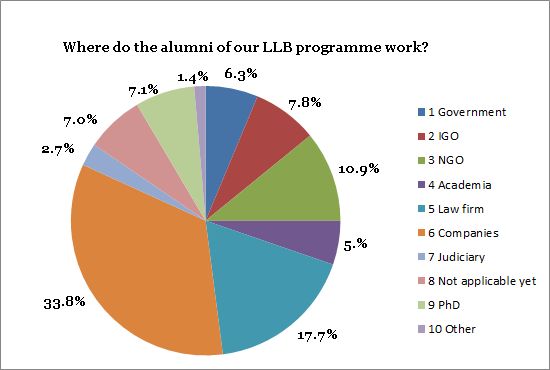Career prospects
As graduates of the LLB programme in International and European Law you will be qualified for careers in diplomacy, as civil servants for national ministries, the EU, the UN or other international organisations, in non-governmental organisations (such as Amnesty International or Greenpeace), in the international commercial sector (such as Unilever or Shell), or in academic teaching and research. This is even moreso when you have also completed an additional master programme.

Participation in Master's degree programmes
Many LLB graduates (97.2%) continue on to specialise in a particular legal field by pursuing an LLM programme, either in Groningen or at other reputable universities. You can read about one of our LLB graduates who pursued an LLM after her studies in Portugal here, and you can read about the experiences of LLB graduates who pursued their LLM in Groningen in our student blog here. One of our graduates who works as an Environmental Lawyer was even elected UG Alumnus of 2023.
Access to the Bar or Judiciary
Our LLB programme International and European Law does not grant access to the bar or judiciary, since the programme does not teach you about a particular national law system. It is possible however to gain access to the bar of judiciary in some cases; it differs per country how this can be done however. If you are interested, you can find more information about getting access to the Dutch bar here. There is also some information about other countries, however, the Faculty is only aware of a few options available.
Career Services
Further, you will have access to the University Career Services and Career Services Law, where you can seek advice about finding and preparing for internships and employment. You can read more about pursuiing an internship while studying in the LLB here.
